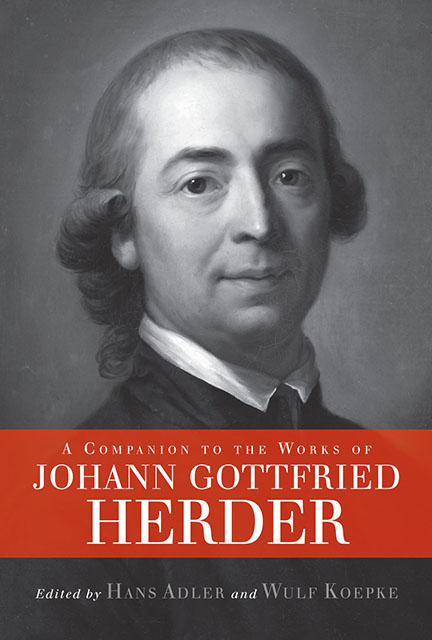Book contents
- Frontmatter
- Contents
- Acknowledgments
- List of Abbreviations
- Introduction
- 1 Herder's Life and Works
- 2 Herder's Epistemology
- 3 Herder and Historical Metanarrative: What's Philosophical about History?
- 4 Herder's Concept of Humanität
- 5 Herder and Language
- 6 Herder's Aesthetics and Poetics
- 7 Myth, Mythology, New Mythology
- 8 Particular Universals: Herder on National Literature, Popular Literature, and World Literature
- 9 Herder's Views on the Germans and Their Future Literature
- 10 Herder's Biblical Studies
- 11 Herder's Theology
- 12 Herder and Politics
- 13 Herder's Poetic Works, His Translations, and His Views on Poetry
- 14 Herder's Style
- 15 Herder as Critical Contemporary
- 16 Herder in Office: His Duties as Superintendent of Schools
- 17 Herder's Reception and Influence
- Bibliography
- Notes on the Contributors
- Index
16 - Herder in Office: His Duties as Superintendent of Schools
Published online by Cambridge University Press: 28 February 2023
- Frontmatter
- Contents
- Acknowledgments
- List of Abbreviations
- Introduction
- 1 Herder's Life and Works
- 2 Herder's Epistemology
- 3 Herder and Historical Metanarrative: What's Philosophical about History?
- 4 Herder's Concept of Humanität
- 5 Herder and Language
- 6 Herder's Aesthetics and Poetics
- 7 Myth, Mythology, New Mythology
- 8 Particular Universals: Herder on National Literature, Popular Literature, and World Literature
- 9 Herder's Views on the Germans and Their Future Literature
- 10 Herder's Biblical Studies
- 11 Herder's Theology
- 12 Herder and Politics
- 13 Herder's Poetic Works, His Translations, and His Views on Poetry
- 14 Herder's Style
- 15 Herder as Critical Contemporary
- 16 Herder in Office: His Duties as Superintendent of Schools
- 17 Herder's Reception and Influence
- Bibliography
- Notes on the Contributors
- Index
Summary
Herder was chief court chaplain, general superintendent, chief court pastor of the municipal church, chief councilor of the consistory, and superintendent of schools; from 1789 on vice president and from 1801 on actual president of the consistory. After his most immediate office at the church, the schools were dearest to his heart.
WITH THIS DESCRIPTION Caroline Herder begins her chapter entitled “Herder's Official Duties and Their Execution” in part 2 of her Erinnerungen, published in 1820. She describes the tasks associated with these offices in greater depth in the biographical notes published in the 1830 edition of the same book (233–34): as a minister he held sermons, accompanied the members of the parish from baptism to the grave, performed and dissolved marriages, supervised the Weimar schools in his capacity of superintendent, appointed directors and instructors, jumped in as substitute teacher when necessary, administered teacher certification exams, proctored the students’ exams, gave speeches at the end of each school year, administered salaries and oversaw the continuing education of teachers (especially those in rural areas), drafted textbooks, syllabi, and new forms of instruction, prepared (beginning in 1789) the sessions of the consistory, which he led from that point on, kept track of all the expenses in his diocese, held his colleagues accountable for their actions, listened to complaints, oversaw the budget for agricultural operations, and doled out professional advice. He accomplished all of this in a reliable manner and with great success, as confirmed by his contemporaries.
But Herder himself was dissatisfied: his suggestions for the reorganization of church, school and state were being implemented too slowly, half-heartedly, or not at all, and the stress of office deprived him of the time for necessary reading and his literary and scholarly works. Thus he complained just two years after his arrival in Weimar about the exhausting daily duties, imagining himself stretched “auf die hölzerne Folterbank” (on the wooden torture rack) wallowing “unter dem alten sächsischen Dreck” (under the old Saxon mess) and, as he wrote in a letter to J. G. Hamann on March 20, 1778, condemned to the fate of Sisyphus: “Eingeklemmt in das einsame Wirrwarr und geistliche Sisyphus-Handwerk, in dem ich hier lebe, ermattet man an Allem und nimmt zuletzt an sich selbst nicht mehr theil.”
- Type
- Chapter
- Information
- A Companion to the Works of Johann Gottfried Herder , pp. 373 - 390Publisher: Boydell & BrewerPrint publication year: 2009



